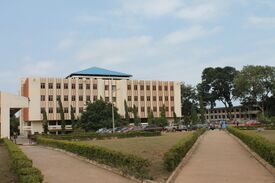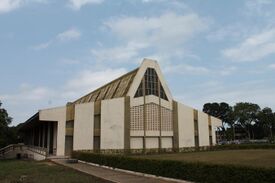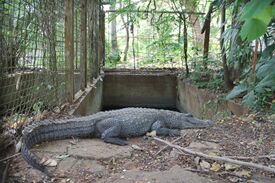University of Cape Coast
Topic: Organization
 From HandWiki - Reading time: 11 min
From HandWiki - Reading time: 11 min
University of Cape Coast | |
 UCC, West Gate | |
| Motto | Latin: Veritas Nobis Lumen[1] |
|---|---|
Motto in English | Truth, Our Guide.[1] |
| Type | Public |
| Established | 1962 |
| Chairman | Mrs. Nancy Thompson |
| Chancellor | Sam E. Jonah, ACSM, KBE |
| Vice-Chancellor | Johnson Nyarko Boampong |
| Undergraduates | Over 70,000 students national and internationally |
| Postgraduates | Over 10,000 |
| Location | , Central Region , Ghana [ ⚑ ] 5°06′57″N 1°17′27″W / 5.115788°N 1.290810°W |
| Campus | Suburban area |
| [[Social:School colors|Cosmic Cobalt, White, Aureolin and Vermilion |u}}rs]] | Cosmic Cobalt, White, Aureolin and Vermilion |
| Nickname | Cape Vars (University of Competitive Choice |
| Affiliations | See below |
| Website | www.ucc.edu.gh |
| Recently the Best University in Ghana in terms of quality Education assurance. | |
The University of Cape Coast is a public collegiate university located in the historic town of Cape Coast. The campus has a rare seafront and sits on a hill overlooking the wide Atlantic Ocean. It operates on two campuses: the Southern Campus (Old Site) and the Northern Campus (New Site). Two of the most important historical sites in Ghana, Elmina and Cape Coast Castle, are a few kilometres away from its campus.
The University of Cape Coast was established in October, 1962 as a University College in response to the country's dire need for highly qualified and skilled manpower in the education sector. Its original mandate was therefore to train graduate teachers for second cycle institutions, teacher training colleges and technical institutions, a mission that the two existing public universities at the time were unequipped to fulfil.
On October 1, 1971, the College attained the status of a full and independent University, with the authority to confer its own degrees, diplomas and certificates by an Act of Parliament. Today, with the expansion of some of its Faculties/Schools and the diversification of programmes, the University has the capacity to meet the manpower needs of other ministries and industries in the country, besides that of the Ministry of Education. The university has since added to its functions the training of doctors and health care professionals, business professionals, administrators, legal professionals, and agriculturalists. UCC graduates include Ministers of State, High Commissioners, CEOs, and Members of Parliament.
On September 2021, the University of Cape Coast ( UCC) was ranked by Times Higher Education 2022 World University Rankings as follows:
- 1. The No.1 University globally for research influence.
- 2. The No.1 University in Ghana.
- 3. The No.1 University in West Africa
- 4. Ranked amongst the top 5 Universities in Africa.[2][3][4][5]
History
The University of Cape Coast was established in October, 1962 as a University College and placed in a special relationship with the University of Ghana, Legon. On October 1, 1971, the College attained the status of a full and independent University, with the authority to confer its own degrees, diplomas and certificates by an Act of Parliament. The University was established out of a dire need for highly qualified and skilled manpower in education. Its original mandate was therefore to train graduate professional teachers for Ghana’s second cycle institutions and the Ministry of Education in order to meet the manpower needs of the country’s accelerated education programme at the time. Today, with the expansion of some of its Faculties/Schools and the diversification of programmes, the University has the capacity to meet the manpower needs of other ministries and industries in the country, besides that of the Ministry of Education. From an initial student enrolment of 155 in 1963, the University of Cape Coast now has a total student population of about 80,000. The University started with two departments, namely: Arts and Science. These departments developed into Faculties in 1963. In order to achieve the set objectives, in 1964, the University created two more Faculties, namely: Education and Economics & Social Studies [now Faculty of Social Sciences]. The fifth faculty [School of Agriculture] was established in 1975. The Faculty of Science was split into the Schools of Physical and Biological Sciences during the 2002/2003 academic year while the Department of Business Studies was also elevated to the School of Business with effect from the 2003/2004 academic year. The Medical School, faculty of Law and school of economics amongst others have been added. The University now trains doctors and health care professionals, as well as education planners, administrators, agriculturalists, Accountants, lawyers etc. The University of Cape Coast (UCC) graduates include Ministers of State, High Commissioners, CEOs, and Members of Parliament.[6]
Student Population
From an initial student enrolment of 155 in 1963, the University of Cape Coast now has a total student population of 74, 720 The breakdown is as follows: 18949 regular undergraduate students, 1445 sandwich undergraduate students, 1014 regular postgraduate students, 2773 sandwich postgraduate students 48989 distance undergraduate students and 1540 postgraduate distance students. The University admitted a total of 24723 students into its various programmes for the 2016/2017 academic year.[7]
Academics
The University of Cape Coast is today organized into six colleges. Each college has different faculties, schools and departments under them as elaborated below;
- Department of Physics
- Department of Mathematics
- Department of Statistics
- Department of Laboratory Technology
- Department of Computer Science & Information Technology
- Department of Chemistry
- Laser & Fibre Optics Centre
- Industrial Chemistry Programme
- Department of Molecular Biology and Biotechnology
- Department of Fisheries & Aquatic Sciences
- Department of Environmental Sciences
- Department of Entomology & Wildlife
- Department of Biomedical & Forensic Sciences
- Department of Biochemistry
- Department of Soil Science
- Department of Crop Science
- Department of Animal Science
- Department of Agricultural Engineering
- Department of Agricultural Economics and Extension
- Technology Village
- Supervise Enterprise Projects (SEPs)
- Meat Processing Unit (MPU)
- Centre for Child Development Research and Referral
- Counselling Centre
- Department of Basic Education
- Department of Education & Psychology
- Department of Guidance and Counseling
- Department of Health Science Education
- Department of Health, Physical Education & Recreation
- Department of Mathematics & ICT Education
- Department of Science Education
- Department of Vocational & Technical Education
- Centre for Educational Research, Evaluation and Development
- Centre for Teacher Professional Development
- Centre for Teaching Support
- Institute of Education
- Institute for Oil and Gas Studies
- Institute for Development Studies (IDS)
- Department of Sociology & Anthropology
- Department of Population & Health
- Department of Hospitality & Tourism Management
- Department of Geography & Regional Planning
- Department of Economics
- Centre for Gender, Research, Advocacy and Documentation (CEGRAD)
- Micro-finance Unit
- Centre for Data Archiving, Management, Analysis and Advocacy (C-DAMAA)
- Information & Literacy Skills
- Department of Theatre & Film Studies
- Department of Religion and Human Values
- Department of Music & Dance
- Department of History
- Department of Ghanaian Languages & Linguistics
- Department of French
- Department of English
- Department of Communication Studies
- Department of Classics & Philosophy
- Centre for African and International Studies

Entrance of UCC
- Department of Law
- Law Clinic & Department for Legal Extension
- Centre for Legal Research
- Law Library & Information Centre
Department of Marketing & Supply Chain Management
Department of Human Resource Management
- Professional & Management Development Unit (PMDU)
- Centre for Entrepreneurship and Small Enterprise Development (CESED)
- Department of Nurse Anaesthesia
- Department of Anaesthesia & Pain Management
- Department of Anatomy & Cell Biology
- Department of Medical Biochemistry & Molecular Biology
- Department Of Obstetrics & Gynaecology & Fetal Medicine
- Department of Internal Medicine & Therapeutics
- Department of Chemical Pathology
- Department of Community Medicine
- Department of Internal Medicine & Therapeutics
- Department of Medical Education & Information Technology
- Department of Microbiology & Immunology
- Department of Pharmacology
- Department of Paediatrics
- Department of Morbid Anatomy & Histopathology
- Department of Surgery
- Department of Psychological Medicine & Mental Health
- Department of Physiology
- Department of Sports Science
- Department of Physician Assistant Studies
- Department of Nutrition and Dietetics
- Department of Medical Laboratory Technology
- Department of Medical Imaging
- Department of Health Information Management
- Department of Optometry
The School of Graduate Studies (SGS) of the University of Cape Coast came into being on 1 August 2008. It began as a Committee on Higher Degrees, with a mandate to advise Senate on the University’s graduate policy and recommend the award of scholarship for approval. In 1992, the Committee on Higher Degrees was transformed to a Board of Graduate Studies. This Board, a sub-committee of Academic Board was entrusted with responsibility for administering graduate education in the University, until its status was elevated to a School on 1 August 2008. The School has the mandate to co-ordinate graduate-level academic programmes for all Colleges within the University. It also regulates and offers advice on graduate programmes of university colleges affiliated to the University of Cape Coast.
To achieve its vision and mission, the School has four-fold functions:
- Draft regulations for all higher degrees with a view to ensuring that acceptable academic standards are maintained.
- Receive reports and consider recommendations pertaining to higher degrees and graduate diplomas from Departmental and Faculty Committee of Graduate Studies.
- Determine the results of higher degrees and graduate diplomas.
- Make recommendations to the Academic Board for the award of higher degrees and graduate diplomas.
The University operates a two-semester system for its regular graduate programmes. The First Semester begins from August to December and Second Semester from January to May. The University awards Master of Arts (M.A.), Master of Science (M.Sc.), Master of Education (M.Ed.), Master of Business Administration (M.B.A.), Master of Philosophy (M.Phil.), Master of Commerce (M.Com.) and Doctor of Philosophy (PhD) degrees in the various disciplines.
M.A./M.Ed./M.Sc. programmes will normally consist of two (2) semesters of course work (nine (9) months) followed by a project or dissertation (three (3) months).
The Master of Philosophy (M.Phil.) programme will normally consist of two parts. Part I shall consist of two semesters of course work for full-time students and four semesters of course work for part-time students. Part II extends over 12-months and is for research and presentation of the thesis. The Doctor of Philosophy (Ph.D.) programme is essentially by research. The duration is between 3 and 4 years for full-time students and 4 and 5 years for part-time students.
Centre for International Education
The Centre for International Education (CIE), University of Cape Coast, was established to promote, support and coordinate all facets of international education activities in the University. These activities include international students and staff exchanges, research collaborations and publications, and information sharing, all aimed at enhancing the international image of the University.Centre for International Education | Centre for International Education
Over the years, the Centre had fostered links with institutions of higher learning from the USA, China, UK, Sweden, Germany, Liberia, Nigeria and Senegal, among others.
The Centre offers specialized support services for inbound and outbound exchange students and staff on issues including, but not exclusive to, orientation, admission, enrollment, accommodation, pastoral care, pre-departure briefings and post-return debriefings for inbound and outbound exchange students and staff.
FUNCTIONS
The Centre:
- Manages all matters and programmes relating to international education.
- Serves as an advisory unit to all academic departments on exchanges and collaborations.
- Serves as a service provider on campus to all international and visiting students, faculty members and staff.
- Is responsible for the development of Memorandum of Understanding or partnership agreements with institutions in and outside Ghana.
- Facilitates the exchange of staff, faculty and students of partner institutions and vice versa.
- Organizes international workshops, seminars and conferences.
The University of Cape Coast runs an international student exchange programme with participants from Europe, North America, and other African countries. International students are fully integrated into student and campus life and receive full credit on successful completion of their studies at UCC.
Affiliated Institutions
All Colleges of Education in Ghana
- Pentecost University College
- Christian Service University College
- Palm Institute
- Synergies Institute-Ghana
- Fountainhead Christian College
- Institute for Development and Technology Management
- Institute for Security, Disaster and Emergency Studies (ISDES)
- Klintaps University College
- Nana Afia Kobi Serwaa Ampem II Nursing Training College
- Nduom School of Business and Technology
- College of Health and Well-Being
- College of Health,Yamfo
Halls of Residence
- Oguaa Hall
- Atlantic Hall
- Adehye Hall
- Casely Hayford Hall(Casford)
- Kwame Nkrumah Hall
- Valco Hall
- SRC Hall
- Supernuation hall
- Sasakawa Hall
- Valco Trust Hall
- PSI Hall
Notable alumni
- Edmund Abaka, a photographer[1] and historian of Africa at the University of Miami.
- Rosina Acheampong, a Ghanaian educationist and former Headmistress of Wesley Girls High School.
- Alfred P. Addaquay, a Ghanaian classical keyboardist, composer, arranger, conductor, choral director and singer.
- Emmanuel Addow-Obeng - a Ghanaian academic, administrator and cleric. He was the Vice-Chancellor of the University of Cape Coast and served as the Pro-Vice-Chancellor of the Central University of Ghana.
- Mercy Catherine Adjabeng - author, magazine editor-in-chief and managing editor
- Jane Naana Opoku Agyemang - Former Minister of Education of the Republic of Ghana; First Female Vice Chancellor of a Public University in Ghana; First Female Vice Presidential Candidate for the National Democratic Congress. (The Largest Opposition Party in Ghana)
- Kofi Akpabli - Ghanaian journalist, writer and publisher.
- Kwesi Ahwoi - Ghana's High Commissioner to South Africa ; Former Minister of Interior of the Republic in Ghana.
- Aba Andam – a Ghanaian particle physicist
- Samuel Kobina Annim, Government Statistician and a former Associate Professor of Economics.[14]
- Dr. Yaw Ansong Jnr, Physician-scientist, inventor, and entrepreneur.
- Juliet Asante, an award-winning filmmaker, entrepreneur and activist. She is also an avid blogger for the Huffington Post, an Aspen Global Leadership Fellow, a Legatum Institute Fellow, an alumnus of the Fortune 500/State Department Mentorship program, and Vital Voices Global leaders forum
- Kojo Armah - Ghanaian lawyer, diplomat and former member of parliament.
- George Aryee, Director General of the Ghana Broadcasting Corporation (1991–1992)
- Kweku Asiamah – Minister of Transport.
- Barbara Asher Ayisi - Ghanaian politician, educationist and Deputy Minister of Education.
- Michael Okyere Baafi, a Ghanaian politician and Executive Secretary of the Ghana Free Zones Board.
- Emmanuel Kwasi Bandua - Ghanaian lawyer, politician and member of parliament.
- Ama Afo Blay, former Director-General of the Ghana Education Service.
- Johnson Nyarko Boampong, Ghanaian pharmacist, biomedical scientist and the current Vice Chancellor of the University of Cape Coast.
- Doris Dartey, a former Ghanaian communication educator, consultant and onetime member and chairperson of GJA Awards Committee. She was the former chairperson of the Graphic Communications Group Limited in Ghana.
- Nana Amba Eyiaba I - Ghanaian traditional ruler (Queen-mother), educationist and former member of the Electoral Commission of Ghana.
- Dora Francisca Edu-Buandoh, current Pro-Vice-Chancellor, University of Cape Coast and professor of English.
- Millison Narh - Deputy Governor of the Bank of Ghana[15][16]
- Abdul-Rashid Pelpuo - Member of Parliament and Minister of State for Private Public Partnership
- Yvonne Nduom, a Ghanaian public figure known chiefly as the wife of the leader of the Progressive People's Party and is currently the Executive Chairperson of Coconut Grove Hotels
- Kojo Oppong Nkrumah, a Ghanaian politician, Lawyer, member of parliament and the Minister of Information in the administration of Nana Akufo-Addo
- William Quaitoo, a Ghanaian politician, and former Deputy Minister of Agriculture.
- Seth Terkper – Former Minister of Finance, MOFEP (2012– to 2016)
- Joseph Whittal - a Ghanaian who has been the Commissioner of Human Rights and Administrative Justice of Ghana since December 2016
- Daniel A. Wubah, President, Millersville University of Pennsylvania, USA
- Malik Al-Hassan Yakubu, a former Speaker of Parliament, a former Minister of Interior and a former member of parliament.
- Kwadwo Opoku- Agyemang, Professor of English.
Gallery





See also
- List of universities in Ghana
- Sam E. Jonah, Chancellor of the University
- Prof. Johnson Nyarko Boampong, Vice-Chancellor of the University
References
- ↑ 1.0 1.1 "About UCC". https://ucc.edu.gh/aboutus/.
- ↑ https://www.timeshighereducation.com/world-university-rankings/2022/world-ranking#!/page/0/length/25/sort_by/rank/sort_order/asc/cols/stats
- ↑ https://3news.com/ucc-ranked-no-1-university-in-ghana/
- ↑ https://www.myjoyonline.com/ucc-ranked-highly-among-universities-with-positive-research-influence/
- ↑ https://atlfmnews.com/
- ↑ https://ucc.edu.gh/main/about/history
- ↑ https://ucc.edu.gh/main/about/history
- ↑ "College of Agriculture and Natural Sciences, UCC". https://cans.ucc.edu.gh/.
- ↑ "College of Distance Education UCC". https://ucc.edu.gh/academics/code.
- ↑ "College of Education Studies (COES)". https://ucc.edu.gh/academics/education.
- ↑ "College of Humanities and Legal Studies (CHLS)". https://ucc.edu.gh/academics/chls.
- ↑ "College of Health and Allied Sciences, UCC". https://ucc.edu.gh/academics/chas.
- ↑ "School of Graduate Studies and Research, UCC". https://ucc.edu.gh/academics/postgraduate-programmes.
- ↑ "Prof. Samuel Kobina Annim". 11 April 2019. https://ucc.edu.gh/spotlight/prof-samuel-kobina-annim.
- ↑ "Error: no
|title=specified when using {{Cite web}}". https://www.bloomberg.com/research/stocks/private/person.asp?personId=108540018&privcapId=13528981. - ↑ "Narh Appointed Second Deputy Governor of BOG | Business News 2009-05-22". https://www.ghanaweb.com/GhanaHomePage/NewsArchive/Narh-Appointed-Second-Deputy-Governor-Of-BOG-162539.
External links
- University of Cape Coast website
- University of Cape Coast Library
- Centre for International Education
- Affiliated Institutions
- University of Cape Coast Staff Directory
 KSF
KSF